Computers are now a big part of our lives. They change how we work, talk, and have fun. They are super fast, thanks to technology, and can do lots of things quickly. This makes them great for getting work done fast and saving money on storage.
But, there are downsides too. Computers might take jobs away and can be risky. There’s a chance of cyber-crimes and health problems from using them too much.
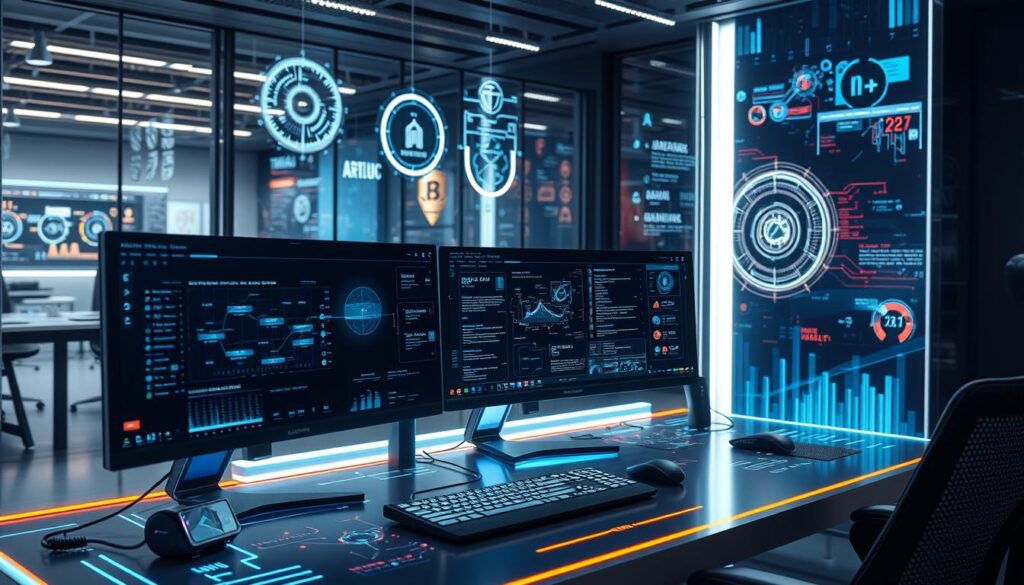
It’s important to know the good and bad sides of computers today. They bring many benefits like being versatile and helping us work better. But, they can also be expensive and might harm our health, like causing eye strain or back pain.
By looking at both sides, we can make smart choices about using computers and new technology.
Key Takeaways
- Computers have revolutionized modern life with their speed and capabilities.
- Advantages of computers include increased productivity and cost-effective storage solutions.
- Disadvantages of computers include the potential for automation to replace workers and health risks.
- Understanding the pros and cons of computers is crucial for informed decision-making.
- Computers can store large amounts of data, with some supporting multiple terabytes of storage.
- Prolonged computer use can lead to health issues, including eye strain and back pain.
Understanding Modern Computing Systems
Modern computer systems have changed a lot over time. New technology has led to different types of computers. These include analog, digital, and hybrid computers, each with its own parts and abilities.
The way we live and work has changed thanks to these advancements. Computers are now smaller, faster, and more powerful.
Computers have hardware and software parts that work together. The hardware includes the central processing unit, memory, and input/output devices. The software includes the operating system and application programs.
New technologies like cloud computing, artificial intelligence, and the Internet of Things have also emerged. These changes have made computers more powerful and versatile.
Modern computers can do millions of tasks per second. They have a lot of storage and can handle many tasks at once. Here are some key features of different types of computers:
| Type of Computer | Characteristics |
|---|---|
| Supercomputer | High processing speed, large storage capacity, and high cost |
| Minicomputer | Moderate processing speed, moderate storage capacity, and moderate cost |
| Microcomputer | Low processing speed, small storage capacity, and low cost |
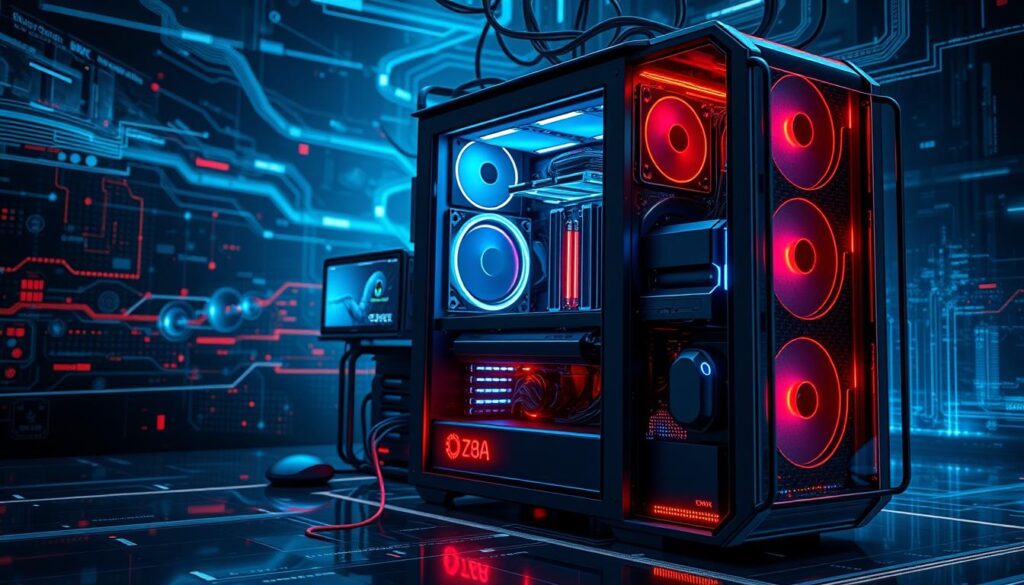
The Role of Computers in Modern Society
Computers are now a key part of our lives, used in finance, education, healthcare, and entertainment. They have a big impact on society, with both good and bad sides. Computers make tasks much faster, saving us hours or days of work.
Computers also change how we talk to each other and find information. With over 4.9 billion people online, they connect us worldwide. They help businesses save money and manage data better.
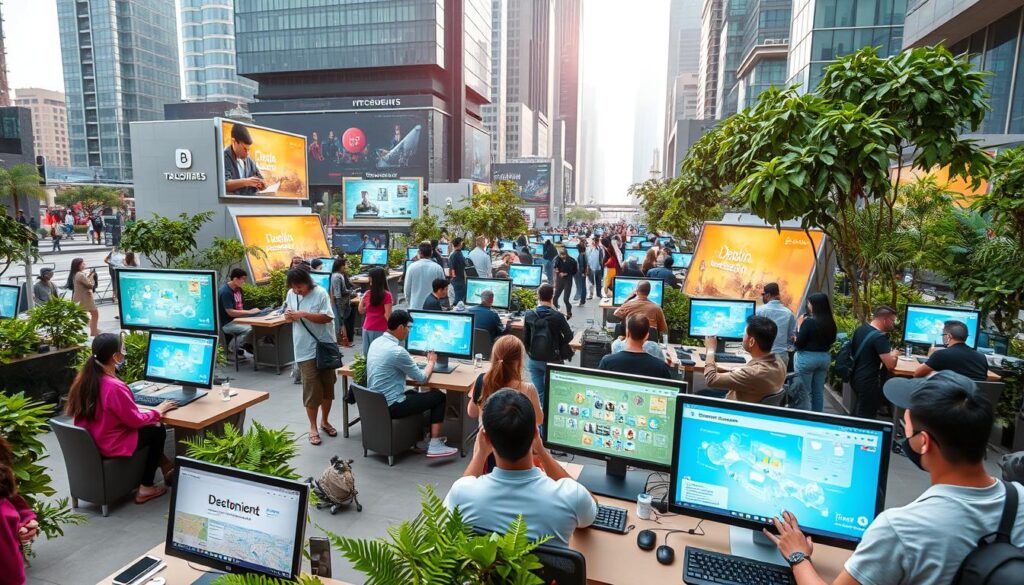
- Increased productivity and efficiency
- Improved communication and access to information
- Enhanced data management and analysis
- Increased global connectivity
But, relying too much on computers can be risky. There are dangers like cyber threats, identity theft, and health problems from too much screen time. We need to find ways to enjoy computers’ benefits while staying safe.
Key Benefits in Professional Settings
Computers bring many benefits to work, like making things more efficient, improving how we talk to each other, and handling data better. In today’s fast world, computers help us do lots of things. This includes writing, designing, coding, and analyzing data.
Some big advantages of using computers at work are:
- Computers make us work faster and better, by doing tasks automatically.
- They help us talk to others better, by letting us work from anywhere.
- Computers are great at managing lots of data, helping us understand it better.
Computers also give us access to many tools and resources. This includes software, online databases, and places to work together. Using these tools, we can work smarter, more efficiently, and be more productive. This helps businesses succeed.
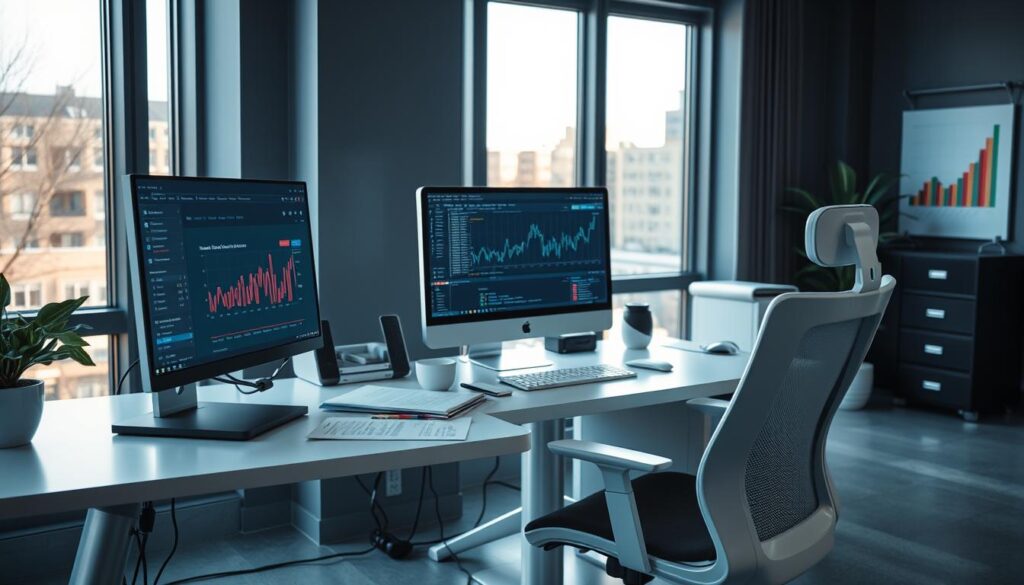
In summary, computers are very helpful at work. They make things more efficient, help us communicate better, and make us more productive. By using computers, businesses can reach their goals and do well.
| Benefit | Description |
|---|---|
| Increased Efficiency | Computers can automate many tasks and processes, freeing up time for more strategic and creative work |
| Improved Communication | Computers enable professionals to connect with colleagues and clients remotely, facilitating collaboration and communication |
| Enhanced Data Management | Computers can store and analyze large amounts of data, providing professionals with valuable insights and information |
Educational Advantages of Computer Usage
Computers have changed education a lot, bringing many benefits. They give instant access to information. Students can find lots of educational stuff online, like digital books and articles.
Some big pluses of using computers in school are:
- Enhanced engagement: Interactive stuff can make students more interested by up to 30%.
- Personalized learning: Tools that adjust to each student can really help learning, making students do better.
- Collaborative learning: Working together online can make teamwork skills better by 20%.
The United Nations Educational, Scientific and Cultural Organisation (UNESCO) says computers make learning better. Digital tools also let students learn on their own, saving time and making learning flexible.
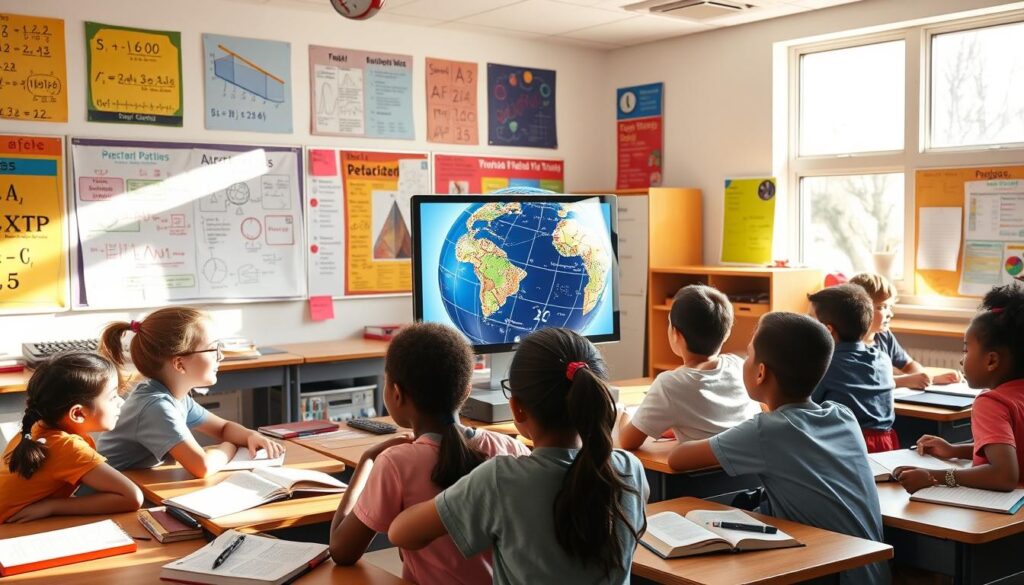
Computers bring many benefits to education, like better access to info and more engaging learning. Teachers can use these benefits to make learning more effective and fun. This helps students get ready for the digital world.
| Benefits | Description |
|---|---|
| Access to Information | Instant access to educational resources, including digital textbooks and online articles. |
| Enhanced Engagement | Interactive multimedia resources increase student motivation by up to 30%. |
| Personalized Learning | Adaptive learning platforms enhance individualized instruction, contributing to higher student achievement. |
Entertainment and Creative Possibilities
Computers have changed how we enjoy entertainment and create. They’ve brought new ways to express ourselves and connect online. The entertainment world has grown with gaming, digital fun, creative software, and making multimedia.
Gaming lets people dive into virtual worlds and meet others live. This is a big change from before.
Computers offer endless creative options. You can make music, videos, and art with software. Making multimedia is easier now, letting people share their work. But, too much computer time can harm your eyes and make you feel lonely.

- 70% of people get eye strain from too much computer time
- 30% more risk of a sedentary lifestyle from too much gaming
- 25% more chance of feeling anxious or lonely from too much gaming
Even with these risks, computers have opened up new ways to have fun and be creative. By knowing the risks and taking steps to avoid them, we can enjoy computers fully.
| Category | Statistic |
|---|---|
| Eye Strain | 70% of individuals experience eye strain due to prolonged computer use |
| Sedentary Lifestyle Risks | 30% increase in sedentary lifestyle risks associated with excessive gaming activities |
| Anxiety and SocialIsolation | 25% higher chance of experiencing symptoms of anxiety and social isolation due to excessive gaming |
Financial Benefits and Cost Savings
Computers offer big financial benefits and cost savings for both people and businesses. They make work faster and more efficient. This can cut down on labor costs and boost performance. For instance, Domino’s Pizza saw an 80% increase in revenue after starting online and mobile ordering.
Computers help save money in several ways:
- They reduce the need for manual labor
- They cut down on mistakes and improve accuracy
- They make production more efficient and reduce waste
- They help teams work better together and avoid misunderstandings
Computers also bring in more money and help make better choices. They give real-time updates and insights. This helps businesses stay competitive and make smart decisions. Using computers can really help an organization’s finances, bringing in financial benefits and cost savings.

| Company | Revenue Increase | Cost Savings |
|---|---|---|
| Dominos Pizza | 80% | Reduced labor costs |
| Other Companies | Varying increases | Improved efficiency and productivity |
Health-Related Disadvantages
Using computers for long periods can harm our health. It can cause physical, mental, and vision problems. Issues like back pain, neck pain, eye strain, and headaches are common.
Physical Health Concerns
Computer use can lead to carpal tunnel syndrome, tendonitis, and poor posture. To avoid these problems, it’s important to take breaks, stretch, and work in a comfortable position.
Mental Health Impact
Computer use can also affect our mental health. It can increase stress, anxiety, and depression. It’s key to balancecomputer time with other activities to stay mentally healthy.
Vision-Related Issues
Eye strain and dry eyes are common in computer users. To prevent these, follow the 20-20-20 rule. Look away from the screen every 20 minutes and focus on something 20 feet away for 20 seconds.

Knowing the health risks of computer use helps us stay healthy. We can reduce risks and keep our bodies, minds, and eyes in good shape.
Security Risks and Privacy Concerns
Computers play a big role in our lives, but they also bring security risks and privacy concerns. Cyber attacks happen every 40 seconds, showing we need strong security to keep our data safe.
Hacking, viruses, and malware are major risks that can harm our privacy. In 2020, the FTC got nearly 5 million reports of fraud and identity theft. This shows how critical it is to tackle these concerns.
To fight these risks, we need to use things like encryption and access controls. Regular backups are also key. We should also think about the big issue of mass surveillance and how it affects our privacy.
Here are some ways to stay safe from security risks and privacy concerns:
- Use antivirus software and firewalls
- Make strong passwords and use multi-factor authentication
- Keep your software and operating systems up to date
- Be careful when clicking on links or sharing personal info online

Knowing about security risks and privacy concerns helps us protect ourselves and our data. It’s important to stay updated on security threats and take steps to avoid them.
| Security Measure | Description |
|---|---|
| Encryption | Protects data by converting it into an unreadable format |
| Access Controls | Restricts access to authorized users through passwords, biometric systems, and multi-factor authentication |
| Regular Backups | Ensures data is recoverable in case of a security breach or system failure |
The Complete Advantages and Disadvantages of a Computer
Thinking about using a computer? It’s key to know the good and bad sides. Computers help us work faster, talk better, and find more info. They can do billions of tasks in a second, way faster than we can. Plus, they’re super accurate, almost 100%, if we give them the right info.
But, there are downsides too. Computers can hurt our health, like causing back pain or eye problems. They also pose security risks and harm the environment. For example, they contribute to a big problem of electronic waste, with 50 million metric tons thrown away every year.
Primary Benefits Overview
- Increased productivity
- Improved communication
- Enhanced access to information
- High processing speed
- High accuracy
Major Drawbacks Summary
- Health risks
- Security risks
- Environmental impact
- Potential for job displacement
- High cost of maintenance and upgrades
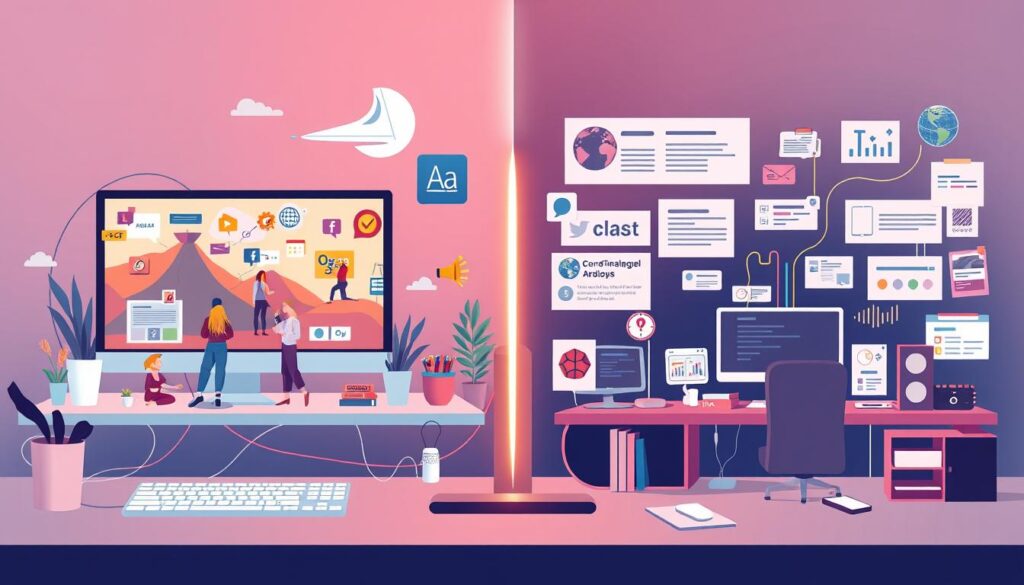
In short, computers have both good and bad points. Knowing these helps us use them wisely. This way, we can enjoy their benefits while avoiding the downsides.
| Advantages | Disadvantages |
|---|---|
| Increased productivity | Health risks |
| Improved communication | Security risks |
| Enhanced access to information | Environmental impact |
Social Impact Considerations
Computers have changed how we connect with each other and our community. They have both good and bad effects. Computers help us form new relationships through social media and online groups.
But, too much computer time can cause social isolation and cyberbullying. Computers also affect our relationships by making us spend more time on screens than with people. They change how we communicate and interact in our community.
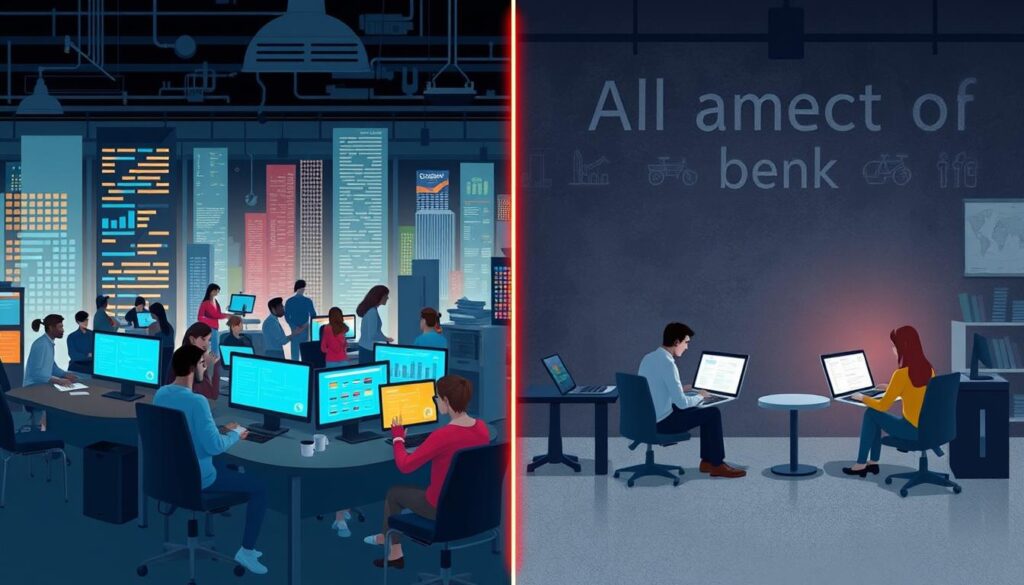
- Cyberbullying and online harassment
- Social isolation and less face-to-face time
- Negative effects on mental and physical health
- Changes in community dynamics and social structures
The social impact of computers is complex. We need to think about how they affect our relationships and community. By understanding these effects, we can make our social environment healthier and more positive.
Environmental Impact of Computer Use
The way computers are made, used, and thrown away affects our planet a lot. The environmental harm from computers includes e-waste, lots of energy use, and using up resources. For example, making just one smartphone needs about 12,760 liters of water. This shows how big the impact of making computers is on our planet.
Computers also use a lot of energy, with data centers using about 70 billion kWh every year. This energy use leads to greenhouse gas emissions, harming our environment. Also, throwing away computers creates e-waste, with only 12.5% of it being recycled. This adds to the growing problem of hazardous waste.

To lessen the environmental impact of computers, we need to use them more wisely. We should use energy-saving parts, recycle, and dispose of them properly. Using cleaner energy like solar power can also help. By doing these things, we can make computers less harmful to our planet and work towards a greener future.
| Category | Environmental Impact |
|---|---|
| Energy Consumption | 70 billion kWh annually |
| E-Waste | 57.4 million metric tonnes generated globally |
| Water Usage | 12,760 liters per smartphone |
Economic Implications
Computers have a big impact on business and society. They help make things more efficient, saving money and boosting productivity. For example, the digital economy lets companies save on physical stores, which means cheaper prices for us.
But, there are also costs like maintenance, upgrades, and training. Despite these, computers generally help the economy grow and make things more efficient.
Some big pluses of using computers include:
- More flexibility and remote work options
- Better tools for talking and working together
- Deeper insights from data analysis
- Access to customers all over the world

In summary, computers have a big impact on business and society. They bring both good and bad effects. As tech keeps getting better, we need to think about how to use computers wisely for the economy’s sake.
| Category | Benefit | Impact |
|---|---|---|
| Business | Increased efficiency | Cost savings, improved productivity |
| Economic | Job creation, GDP growth | Increased economic activity, competitiveness |
| Social | Improved communication, access to information | Enhanced quality of life, social connections |
Future Considerations and Trends
Looking ahead, we see new trends shaping the computer world. Artificial intelligence, blockchain, and the Internet of Things are leading the way. These changes will deeply impact how computers evolve and affect our daily lives.
Cloud computing, online learning, and telemedicine are big trends to watch. They promise to boost productivity and make education and healthcare more accessible. It’s vital to weigh the benefits and risks of these new technologies.
Here are some key statistics that highlight the impact of technology on various industries:
- Modern technology boosts productivity by automating routine tasks, accounting for a reported increase in efficiency across various industries.
- Project management tools can improve team collaboration and efficiency by as much as 20%.
- The rise of online learning platforms has led to a 40% increase in adult learners participating in online courses.

In conclusion, the future of computers is full of promise. As we explore new trends and considerations, remember that technology keeps evolving. Its effects will be seen in many areas of our lives and industries.
| Industry | Impact of Technology |
|---|---|
| Manufacturing | Increased productivity and efficiency |
| Education | Greater accessibility and increased participation |
| Healthcare | Improved accessibility and patient outcomes |
Maintaining Healthy Computer Usage
Using computers in a healthy way is key to avoiding health issues. It’s important to take breaks, exercise, and use computers correctly. This helps keep you physically and mentally well.
Best Practices for Computer Use
Here are some good habits for using computers:
- Take a 10-15 minute break every hour to stretch and move around
- Place your computer monitor about 20-25 inches in front of you
- Keep your keyboard right in front of you, with wrists straight and elbows at 90 degrees
- Don’t look at screens for at least an hour before bed
Ergonomic Considerations
Good ergonomics are also vital for healthy computer use. Use a comfy chair and keep your feet on the floor or a footrest. Also, avoid screens for too long.
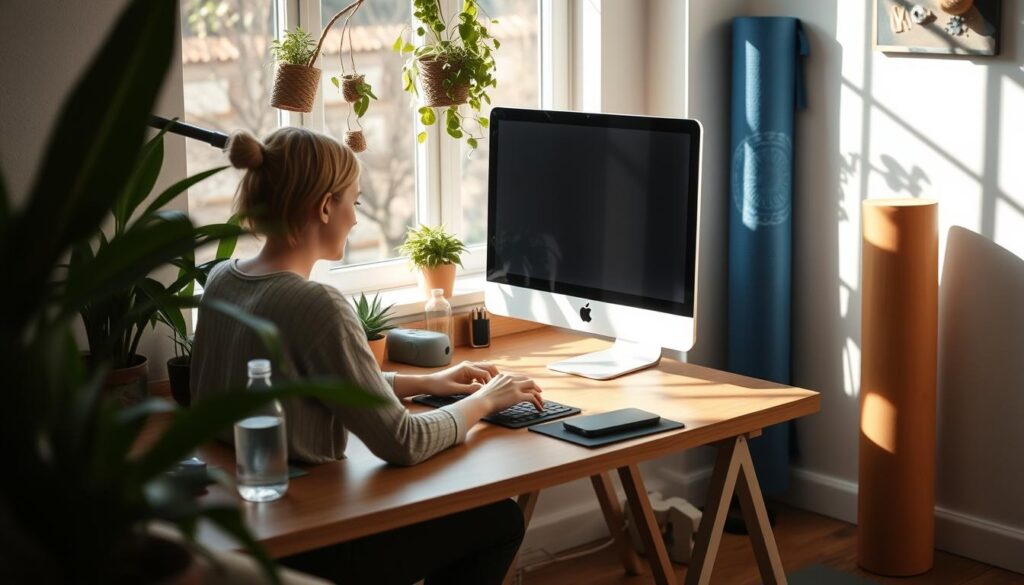
| Best Practice | Benefits |
|---|---|
| Taking regular breaks | Reduces eye strain and improves productivity |
| Exercising regularly | Improves overall health and reduces the risk of chronic diseases |
| Following proper ergonomics | Reduces the risk of musculoskeletal disorders and improves comfort |
By sticking to these tips and ergonomic advice, you can stay healthy while using computers. This helps avoid physical and mental health problems.
Balancing Technology in Daily Life
Technology is now a big part of our lives. It’s important to find a balance between using technology and other parts of life. Setting boundaries and making time for face-to-face interactions is key. For example, online learning can save students a lot of time on commutes. But too much screen time can harm our health.
To find a balance, try these tips:
- Make time each day to not use devices
- Do outdoor activities and exercise
- Find hobbies that make you feel good mentally

Using these strategies can help avoid problems like sleep issues, feeling lonely, and being less productive. A good balance between tech and life can make us healthier, more productive, and help us connect better with others.
| Benefits of Balance | Outcomes |
|---|---|
| Improved mental health | Less anxiety and depression |
| Increased productivity | Manage time better and stay focused |
| Stronger relationships | More face-to-face time and understanding |
Practical Tips for Maximizing Benefits
To get the most out of your computer, it’s key to follow practical tips. These tips help you work better and faster. Setting goals, focusing on what’s important, and using tools to stay organized are all important steps.
Using these tips can lead to many benefits. You’ll work more efficiently, communicate better, and learn more. By using technology wisely, you can make the most of your computer.
Here are some tips to help you:
- Run regular maintenance tasks, such as Check Disk and Disk Cleanup, to ensure optimal performance.
- Use productivity tools, such as to-do lists and calendars, to stay organized and focused.
- Set goals and prioritize tasks to achieve success in both personal and professional life.
By following these practical tips, you can unlock your computer’s full power. Enjoy all the good things technology has to offer.
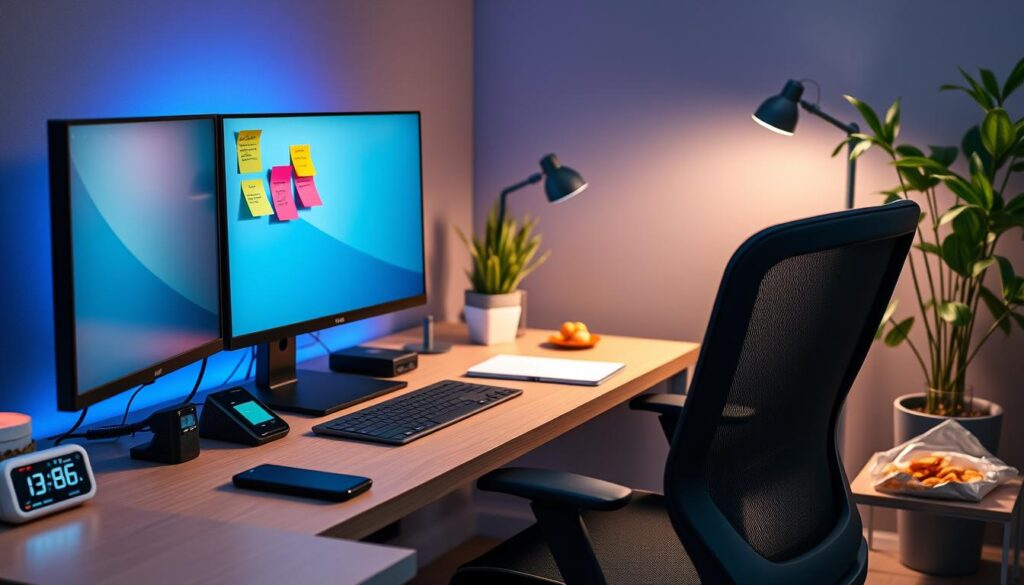
Remember, to get the most from your computer, you need practical tips, tools, and regular care. By doing these things, you can use your computer to its fullest and reach your goals.
| Task | Frequency |
|---|---|
| Run Check Disk | At least once a week |
| Run Disk Cleanup | As needed |
| Use productivity tools | Daily |
Conclusion
Computers have changed our lives in big ways, bringing us lots of benefits and some risks. It’s important to find a balance. This way, we can enjoy the good things about computers while avoiding the bad.
By knowing the advantages and disadvantages of computers, we can make better choices. This helps us get the most out of computers and stay safe.
We need to watch out for computer-related health concerns and keep our devices secure. This helps us use computers wisely. It makes our lives better and keeps us safe.
As technology gets even more advanced, we must be careful. Let’s use computers in a way that helps us, not hurts us. This way, we can enjoy all the good things they offer.
FAQ
What are the advantages and disadvantages of using computers?
Computers are key in today’s world, changing how we work, talk, and have fun. They help us work better, talk more easily, and find lots of information. But, they also bring problems like health issues, security threats, and privacy worries.
What are the different types of computers and how have they evolved?
There are many kinds of computers, like desktops, laptops, tablets, and phones. Over time, computers have gotten smaller, faster, and more powerful. This has led to new things like cloud computing, AI, and the Internet of Things.
How do computers impact modern society?
Computers have changed many parts of our lives, like work, school, health care, and fun. They help us work better, learn more, and have fun in new ways. But, they also make us less social and can harm the environment.
What are the key benefits of using computers in professional settings?
Computers make work better by helping us communicate, manage data, and work together. They make us more productive, help us make better decisions, and improve how we work in many fields.
What are the educational advantages of computer usage?
Computers have changed learning and teaching. They give us more information, make learning fun, and help us do better in school. This makes education more fun and easy to get.
What are the entertainment and creative possibilities of computers?
Computers have brought new fun, like video games, virtual reality, and social media. They also let us create digital art, make videos, and use creative software.
What are the financial benefits and cost savings of using computers?
Computers save money in many areas, like finance, health care, and education. They make us work better, make decisions faster, and save money for people and companies.
What are the health-related disadvantages of using computers?
Using computers too much can hurt our bodies, like our backs, eyes, and heads. It can also make us stressed and less focused.
What are the security risks and privacy concerns associated with computer use?
Computers can get viruses, be hacked, and have data stolen. It’s important to know how to protect our data and keep our privacy safe.
What are the social impact considerations of computer use?
Computers have changed how we talk, make friends, and connect with others. They offer new ways to meet people, but can also make us less social and less connected in real life.
What are the environmental and economic implications of computer use?
Computers can harm the environment, from making them to throwing them away. They also change how businesses work, bringing benefits like better efficiency but also costs like upkeep and upgrades.
What are the future considerations and trends in computer use?
Computers will keep getting more important in our lives, bringing more benefits like better work and health. But, they will also bring new challenges and risks that we need to face.
How can we maintain healthy computer usage?
To use computers safely, we should set up our workspaces right, take breaks, and stay active. It’s also key to balance computer time with other parts of our lives for our health.
How can we maximize the benefits of computer use?
To get the most from computers, we can set goals, focus on what’s important, and use tools to help us work better. By doing these things, we can be more productive, communicate better, and succeed more.